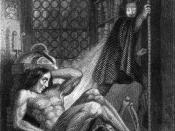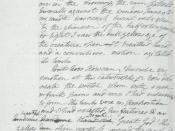Back in the early 19th century, when Mary Shelly and Bram Stoker composed Frankenstein and Dracula, neither author could have fathomed the enduring relevance of their work for so many years to come. Both texts are accepted by our culture as valuable will continue to do so. This can be attributed to them providing a vibrant insight into their contextual values and ideas, the archetypes of creator and created, and being one of the pioneer and best examples of horror and science fiction literature ever published. Their appropriation into many forms, such as the films; Edward Scissorhands directed by Tim Burton and Frankenstein by Kenneth Branagh integrates the archetypes and dualities embodied in Mary ShelleyÃÂs Frankenstein into our popular contemporary culture.
All the aforementioned texts encompass the creator/created archetype, Frankenstein creates the rejected creature, the ÃÂInventorÃÂ manufactures Edward and hatred of the Church produces Count Dracula. During the time that Shelley and Stoker were crafting their masterpieces, fanatic science proliferation surrounded their everyday lives, which are evidently imprinted in their work.
FrankensteinÃÂs answer to curing death ironically inflicts more loss than salvation, reminiscent of Count Dracula renouncing the Church and God, declaring he will rise from the grave to avenge his brideÃÂs death with all the powers of darkness. After 400 years, he confesses to mourn and regret the loneliness of eternal life. Both authors question the morality and ability to truly exceed the limitations of mortality.
More so than Mary ShelleyÃÂs Frankenstein, Bram Stoker taps into the horror elements to structure DraculaÃÂs plot. This is seen through the CountÃÂs gory killing spree and the haunted castle housing his vampire wives who feed off Harker. Published at a time when much of the responders were devout Christians or Catholics, DraculaÃÂs defiance of the Church and blasphemy carries a much stronger...


![[Edward McCall presents a silver basket of flowers to New York Giants manager John McGraw at Polo Grounds, NY (baseball)] (LOC)](https://s.writework.com/uploads/3/32066/edward-mccall-presents-silver-basket-flowers-new-york-giant-thumb.jpg)